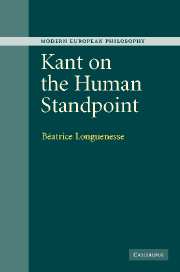Book contents
- Frontmatter
- Contents
- Acknowledgments
- Introduction
- PART I Revisiting the capacity to judge
- PART II The human standpoint in the Transcendental Analytic
- Part III The human standpoint in the critical system
- 8 The transcendental ideal, and the unity of the critical system
- 9 Moral judgment as a judgment of reason
- 10 Kant's leading thread in the Analytic of the Beautiful
- Bibliography
- Index of citations
- Index of subjects
9 - Moral judgment as a judgment of reason
Published online by Cambridge University Press: 22 September 2009
- Frontmatter
- Contents
- Acknowledgments
- Introduction
- PART I Revisiting the capacity to judge
- PART II The human standpoint in the Transcendental Analytic
- Part III The human standpoint in the critical system
- 8 The transcendental ideal, and the unity of the critical system
- 9 Moral judgment as a judgment of reason
- 10 Kant's leading thread in the Analytic of the Beautiful
- Bibliography
- Index of citations
- Index of subjects
Summary
Kant says relatively little about moral judgment. He spends much more time and care explaining and justifying the content of the moral law, expounded in the different formulations of the categorical imperative: “Act only in accordance with that maxim through which you can at the same time will that it become a universal law”; “So act that you use humanity, whether in your own person or in the person of any other, always at the same time as an end, never merely as a means”; “Act only so that the will could regard itself as at the same time giving universal law through its maxim.”
To be sure, these formulations of the categorical imperative are supposed to function as principles or premises for inferences determining a system of duties. In other words, they must serve as principles for two kinds of moral judgments: (1) those by which we determine what we are supposed to do or refrain from doing in virtue of a specifically moral commitment, that is, a commitment independent of any consideration of utility or of personal happiness; (2) those by which we subject to a moral evaluation the actions already performed by ourselves or by others, and the characters of those who performed them. So there is of course a relation between moral law and moral judgment, the originality of Kant's position being precisely that he makes the former the unconditioned principle of the latter.
- Type
- Chapter
- Information
- Kant on the Human Standpoint , pp. 236 - 264Publisher: Cambridge University PressPrint publication year: 2005
- 1
- Cited by



